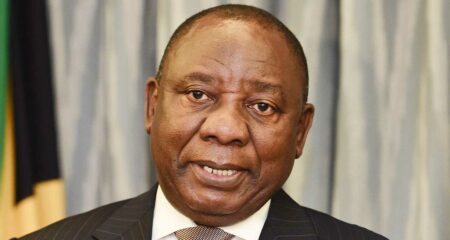
President Jacob Zuma may maintain his political clout well after he relinquishes office if his ex-wife and mother of four of his children, Nkosazana Dlamini-Zuma, succeeds him.
While Zuma, 75, hasn’t openly anointed an heir, his comments that the party is ready to be led by a woman have been widely seen as support for Dlamini-Zuma to replace him in December as leader the ANC and as the nation’s president in 2019. She’s being guarded by the presidential protection unit even though she holds no official post.
Since returning to South Africa last month following a five-year stint as head of the African Union Commission, Dlamini-Zuma has crisscrossed the country addressing ANC and church meetings echoing Zuma’s call for “radical economic transformation” to give the country’s black majority a bigger stake in the economy. Her bid to lead the ANC has been openly backed by key Zuma allies, including the party’s women’s league and its youth wing in KwaZulu-Natal.
“If she wins, then Jacob Zuma will call the shots from behind the scenes,” Mcebisi Ndletyana, a political science professor at the University of Johannesburg, said by phone. “She is using his infrastructure and his support base and his proxies seem to be aligned behind her candidature.”
Zuma, a former intelligence operative who’s been implicated in a series of scandals, may need a pardon from his successor to avoid being jailed for 783 graft charges that were dropped just weeks before he became president in 2009, according to Ndletyana.
The main opposition party, the Democratic Alliance, filed a lawsuit to have the charges reinstated, and last year the high court found the decision to scrap the case was wrong — a ruling Zuma and prosecutors are contesting in the supreme court of appeal.
While Dlamini-Zuma has strong leadership credentials, her failure to speak up about the pervasive corruption under the Zuma administration has tainted her image and campaign, said Nomboniso Gasa, an independent political analyst.
“It is difficult to separate her from everything that is wrong about Zuma,” Gasa said. “Her messages are very similar to those of Zuma. It is very clear that she is not going to come with a different vision. Zuma’s legacy is going to continue.”
Stagnating economy
Under Zuma’s leadership, South Africa has stagnated and the unemployment rate has hit a 13-year high. S&P Global Ratings and Fitch Ratings downgraded the nation’s credit rating to junk this month after Zuma fired his finance minister, Pravin Gordhan, who had sought to curb spending and waste and frustrated the president’s plans to build new nuclear plants.
Dlamini-Zuma, who qualified as a medical doctor and served as minister of health, foreign affairs and home affairs before being elected to her African Union post, divorced Zuma in 1998. In January, the Sunday Times cited five of Zuma’s family members as saying Dlamini-Zuma, 68, and her children have a house in the president’s private homestead in the KwaZulu-Natal village of Nkandla and she has been a regular visitor there.

The compound has been the focus of a national controversy. Last year, South Africa’s top court ruled that Zuma violated his oath of office when he ignored a graft ombudsman’s directive to repay taxpayer funds spent on a building a swimming pool, amphitheatre and cattle kraal.
Dlamini-Zuma has refused to answer questions as to why she’s been allocated state cars and bodyguards normally reserved for serving or retired heads of state, or spell out what radical economic transformation should entail. In recent speeches, she’s accused schools of teaching students to oppose the ANC and called for greater black ownership of the banking industry.
She comes across as arrogant and lacking in charisma, said Theo Venter, a political analyst at North West University’s business school in Potchefstroom, west of Johannesburg.
“There are some serious misgivings around whether she is a good candidate,” Venter said. “If you are an opposition party, you can only hope that she makes it because when it gets to 2019 everything that is happening this year will be painted on her and she will have a horrible time in defending the ANC.”
After tens of thousands of South Africans took to the streets on 7 April to protest Zuma’s decision to fire Gordhan, a post appeared on Dlamini-Zuma’s verified Twitter account calling the protests “rubbish”. Dlamini-Zuma said the post was fake and it was later deleted.
Five political analysts surveyed by Rand Merchant Bank said Zuma’s continued presence in office and the possibility that Dlamini-Zuma may succeed him could place the ANC at risk of losing its majority in the 2019 elections, the Johannesburg-based lender said in a report.
Dlamini-Zuma’s office didn’t respond to several requests for an interview.
Her main rival in the ANC leadership battle is deputy President Cyril Ramaphosa, a lawyer, former labour union leader and the second richest black South African, according to the Sunday Times. He publicly criticised Zuma’s decision to fire Gordhan.
“Nkosazana Dlamini-Zuma’s victory would send a negative signal, if only because of the trust deficit that Zuma has created,” said Anne Fruhauf, vice president at New York-based risk adviser Teneo Intelligence. “She may well develop her own agenda over time but she might find it difficult to make marked departures from Zuma’s policies, including the nuclear programme, if she owes her political victory primarily to the president’s backers.” — (c) 2017 Bloomberg LP




